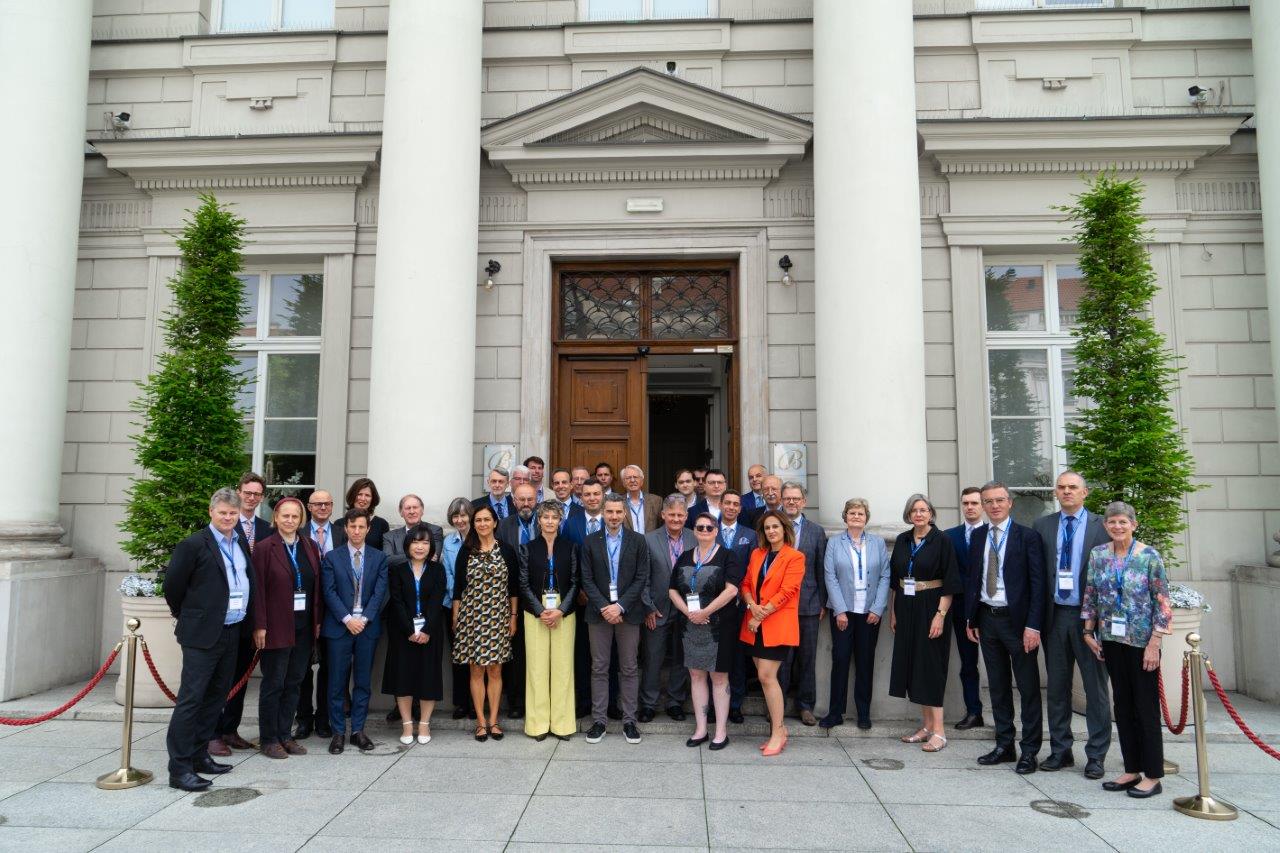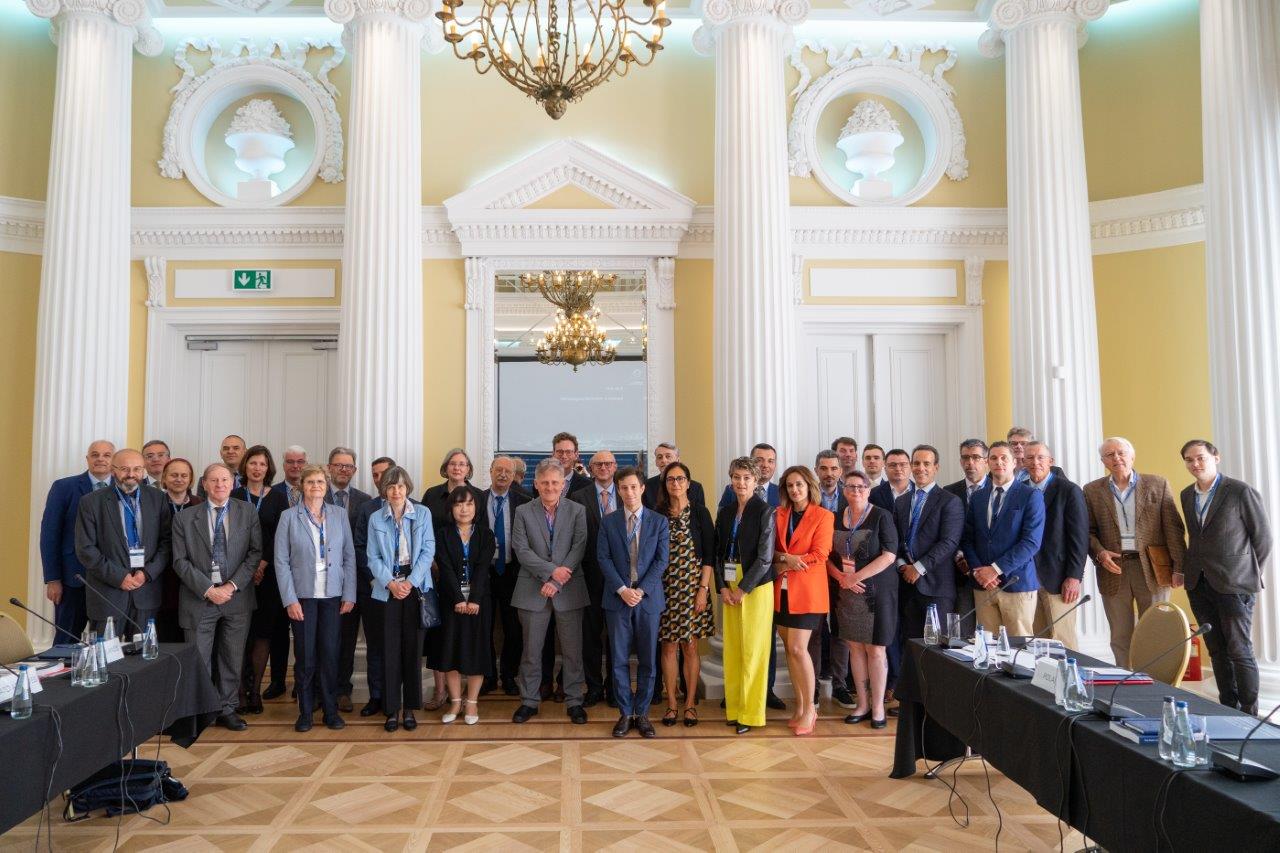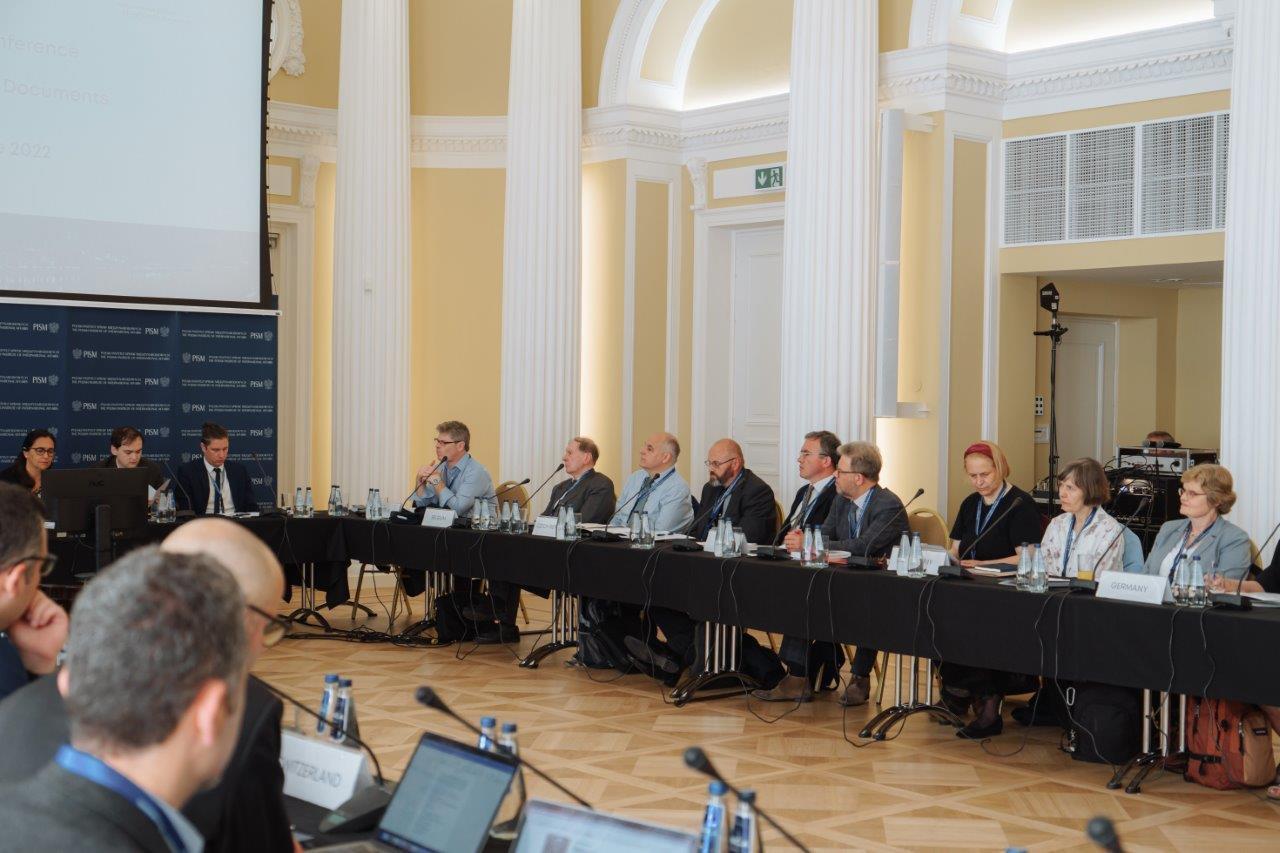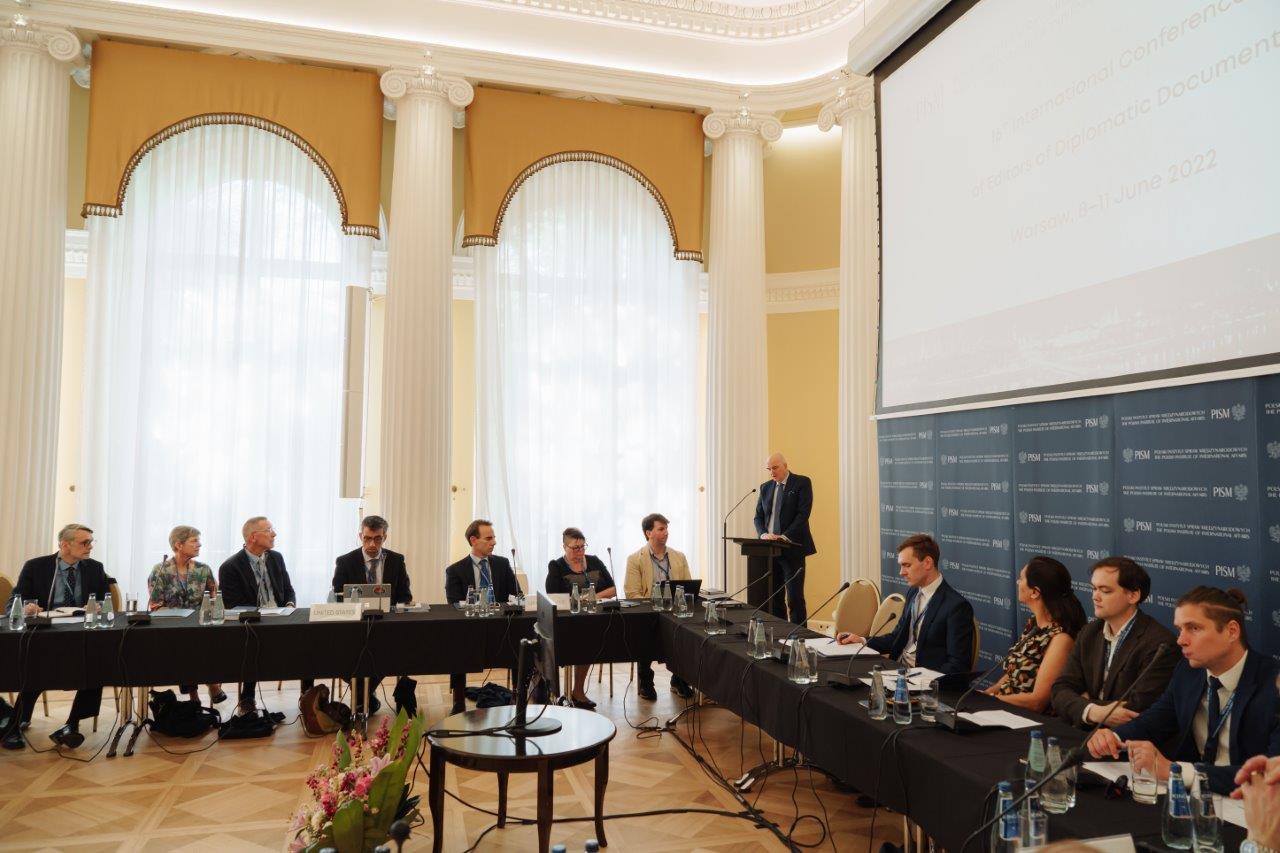XVI Międzynarodowa Konferencja Wydawców Dokumentów Dyplomatycznych
Zakończenie spotkania:
 PISM
PISM
Polski Instytut Spraw Międzynarodowych był gospodarzem XVI Międzynarodowej Konferencji Wydawców Dokumentów Dyplomatycznych. Spotkanie zorganizowane w dniach 8–11 czerwca 2022 r. w Warszawie stanowi element, funkcjonującej od ponad 30 lat, międzynarodowej współpracy edytorów źródeł historycznych z kilkudziesięciu krajów.
W przedsięwzięciu realizowanym po raz pierwszy w Europie Środkowej wzięli udział wydawcy z 22 państw, którzy w trakcie ośmiu sesji konferencji dzielili się doświadczeniem i wiedzą na temat edycji i upubliczniania dokumentów archiwalnych dotyczących polityki zagranicznej. W czasie obrad delegaci wygłosili 27 prezentacji i przemówień, których tematyka obejmowała zarówno tradycyjne metody edycji, jak też zagadnienia związane z edycjami elektronicznymi i projektami tzw. historii mówionej.
Konferencja stanowiła także okazję do zaprezentowania na forum międzynarodowym najnowszych tomów opublikowanych w ramach serii Polskie Dokumenty Dyplomatyczne, a efektem przedkonferencyjnej współpracy wydawców była również edycja zbioru dokumentów „Polish Crisis 1980-1982 from the Western Perspective”



Programme
16th International Conference
of Editors of Diplomatic Documents
8–11 June 2022 Warsaw
Thursday, 9 June
09.00–09.30
Arrival and registration at the conference
09.30–9.45
Opening of the conference
- Official welcome by Sławomir Dębski (Director of the Polish Institute of International Affairs)
9.45–11.15 Session 1
Series in New(re)born Countries
- Chair: Helena Pinto Janeiro (Portugal)
- Algimantas Kasparavičius (Lithuania): Publication of 20th Century Diplomatic Documents in Lithuania: Experiences and Challenges
- Oleksandr Avramchuk (Ukraine): A phoney autonomy? Soviet Ukraine’s foreign relations in historical context, 1917–1991
- Dušan Segeš (Slovakia): «Limited Edition» – Diplomatic Documents Published in Slovakia
11.15-11.30 Conference photo
11.30-12.00 Coffee break
12.00–13.45 Session 2
National Programmes
- Chair: Jean-Luc De Paepe (Belgium)
- Jindřich Dejmek, Jan Němeček (Czech Republic): Documents of Czechoslovak Foreign Policy (The State of Research)
- Gusztáv D. Kecskés (Hungary): Documentary Publications on the First 100 Years of Independent Hungarian Foreign Policy (1918–2018)
- Miruko Atsuta (Japan): Japanese Diplomatic Documents: Recent Publications and Events on Bilateral Relations
- Georgios Polydorakis (Greece): Greece Liberated: Recognition and Establishment of Diplomatic and Consular Relations
13.45–14.45 Lunch break
14.45–16.15 Session 3
Gaps in Series (Uncovered Periods), part I
- Chair: Adam Howard (USA)
- Sławomir Dębski (Poland): The Missing Decade – the Twenties in Polskie Dokumenty Dyplomatyczne series
- Richard Smith (United Kingdom): Continuity and Discontinuity in the British Diplomatic Document Publishing Programme
- Mechthild Lindemann (Germany): The Missing Link: Filling in the Gap in the Series of Documents on the Foreign Policy of the Federal Republic of Germany (AAPD)
16.15–16.45 Coffee break
16.45–18.15 Session 4
Gaps in Series (Uncovered Periods), part II
- Chair: Elke Freifrau von Boeselager (Germany)
- Sacha Zala (Switzerland): «Mind the gap!» Swiss Digital Strategies for the «anni horribiles» 1979–1989
- Matthew Jordan (Australia): No Foreign Policy to Speak of? Recent Efforts to Cover the Prehistory of Documents on Australian Foreign Policy, 1901–1936
- Mandy A. Chalou (USA): Covering Public Diplomacy in the Foreign Relations Series
18.15–18.30 Questionnaires updates
- Piotr Długołęcki (Poland)
Friday, 10 June
08.30–09.30 ICEDD Bureau Meeting (Bureau members only)
9.45–11.15 Session 5
The Challenges Beyond Traditional Editing
- Chair: Jean-Philippe Dumas (France)
- Cees Heere (Netherlands): Oral History, Digital Publication, and the Diplomatic Archive
- Joe Wicentowski (USA): New Digital Indexes and Annotations for the Foreign Relations Series
- Marek Rodzik (Poland): The Challenge of Translation. A Case of «Confronting the Holocaust. Documents on Polish Government in Exile’s Policy Concerning Jews 1939–1945»
11.15–11.45 Coffee break
11.45–13.30 Session 6
Discovering Twitter. Diplomatic Documents in Social Media
- Chair: Ayşe Selcan Şanlı (Turkey)
- Mandy A. Chalou (USA): HistoryAtState: An Exploration of 10 Years on Twitter
- Michael Kennedy (Ireland): Ten Years Tweeting: Looking Back and Thinking Forward
- Thomas Bürgisser (Switzerland): The Thirtieth is the «annus mirabilis». @Dodis on Social Media
- Marcin Furdyna (Poland): Twitter from Scratch. How to Present the History of Polish Diplomacy in 280 Characters?
13.30–14.30 Lunch break
14.30–16.00 Session 7
Polish Crisis 1980–1982 from Western Perspective, part I
- Chair: Antonio Varsori (Italy)
- Louise Fischer (Israel): An Uncomfortable Legacy: Polish–Israeli Relations in the Early 1980s and the Israeli View of the Crisis in Poland
- Ilse Dorothee Pautsch (Germany): The Federal Republic of Germany and Polish Crisis 1980/81
- Nicolas Chibaeff (France): The Polish Crisis and the French Questioning of its Soviet Policy
- Ineke Deserno (NATO Archives): Declassifying documents on NATO’s view on the situation in Poland in 1981
16.00–16.30 Coffee break
16.30–18.00 Session 8
Polish Crisis 1980–1982 from Western Perspective, part II
- Chair: Aryo Makko (Sweden)
- Richard Smith (United Kingdom): Encouraging «socialism with a more human face»: Britain’s Response to the Polish Crisis of 1980–81
- Mircea A. Munteanu (USA): One of These Days: US Efforts to Discourage a Soviet Invasion of Poland, 1980–1981
- Piotr Długołęcki (Poland): The Polish Crisis from Western Perspective: An Attempt at Interpretation
18.00–18.15 Coffee break
18.15–19.00 ICEDD General Assembly
